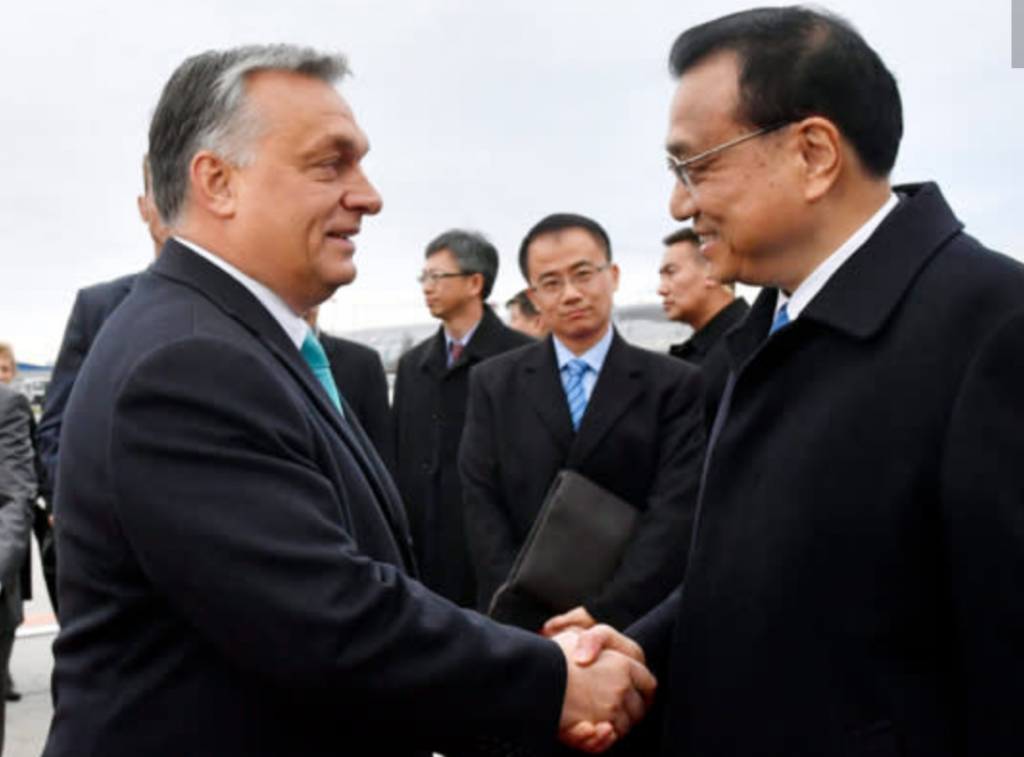Chinese money sows European disunion
Source: Nikkei Asian Review / www.asia.nikkei.com /
TOKYO — The roots of democracy once looked destined to spread worldwide. Yet now they are withering as one country after another veers toward authoritarianism.
This is especially noticeable in Eastern Europe. And lest anyone in Asia consider it a distant problem, take note: The growing influence of China appears to be one of the major factors.
The immediate concern is Russia, which has rattled the U.S. and Europe with alleged election interference and barrages of “fake news.” But China’s economic might is raising fears that it could do more to weaken democratic systems in Eastern Europe, even in European Union member states that have ostensibly accepted democracy and the market economy.
“In the long run,” one Polish politician said, “China’s political influence is more dangerous because its national power is stronger beyond comparison to Russia’s.”

On a recent visit to Europe I felt an unmistakable sense of crisis that the foundations of democracy are at risk of collapsing. The obvious example is Hungary, where Prime Minister Viktor Orban has strengthened his control of the media and the judiciary while frequently lashing out with anti-immigrant rhetoric. In parliamentary elections on April 8, Orban’s ruling party scored an overwhelming victory.
Poland, which used to be called “a model student of democratization,” faces possible punishment from the EU over legal reforms that strengthen the government’s ability to interfere in the justice system.
In the Czech Republic, billionaire businessman Andrej Babis became prime minister in December. The man regarded as the country’s Donald Trump is alleged to have collaborated with the communist secret police during the Cold War.
Where does China come in? Slowly but steadily, the country is expanding its presence in Eastern Europe. Since 2012, China has held an annual “16 plus one” forum on economic cooperation with 16 Eastern European states.
Through the forum, China has already pledged to invest a total of $15 billion in infrastructure improvements, according to the Financial Times. At a meeting held in Hungary last November, furthermore, Chinese Premier Li Keqiang made a new commitment to spend 3 billion euros ($3.7 billion) on economic cooperation.
The forum includes Hungary, Poland and nine other EU members. If these 11 countries reinforce their ties with Beijing and turn Eastern Europe into a “pro-China bloc,” it would drive a wedge into the EU, which values democracy and the rule of law.
Germany and France have repeatedly raised concerns about the 16-plus-one forum with Eastern European countries. One EU diplomat warned that China is trying to split the Continent. If this is left unchecked, the official said, the EU will not be able to deal with China in a unified manner.
Cracks in EU unity are already showing, as some eastern countries have sided with China on certain issues. On the question of territorial disputes in the South China Sea, the EU criticized China in a statement in summer 2016. But the criticism was watered down from the original draft, due to opposition from countries like Hungary.
The EU takes a consensus-based approach to key decisions on diplomacy and security. So it is difficult for the bloc to stand up to China if a member digs in its heels. This weakens the EU’s bargaining power and ultimately works against the interests of its members, including the Eastern European ones.

“Because China is too big, it is much better for European countries to handle their relations with China through the EU framework, not bilaterally,” said Jiri Pehe, director of New York University in Prague.
An EU statement criticizing China’s territorial moves in the South China Sea was watered down, due to opposition from countries such as Hungary.
Not everything is rosy in China’s relationship with Eastern Europe. Some countries are frustrated with what they see as big talk and limited action on Beijing’s part. China still accounts for only about 1% of the Czech Republic’s total exports.
“There is a lot of talk about the rise of China, but if we look at the numbers in the region, it’s clearly disappointing,” said Petr Kratochvil, director of the Institute of International Relations Prague. “Czech’s trade relations with China, by an order of magnitude, are even below Slovakia. We export around 80% to EU members.”
There are also politicians and intellectuals in Eastern Europe who urge prudence in strengthening ties with China. Pehe noted the “strong support for human rights” in a “certain part of the political spectrum” in the Czech Republic — a legacy of the country’s first president, Vaclav Havel. “So they all say if we have relations with China, we should also stand up and speak on behalf of Tibet and Taiwan.”
Yet, for some Eastern European leaders, there is a lot to like about China’s authoritarian model. It offers the promise of retaining power while curbing social discontent over corruption and inequality.
One Hungarian political scientist suggested that Orban is determined to forge ahead with a Chinese-backed high-speed rail link between Budapest and Belgrade, regardless of profitability, because he wants to get closer to China and study its heavy-handed model.
The retreat of democracy is not exclusive to Eastern Europe. It is happening in Asia, too.
The governments of Cambodia and Malaysia are clamping down on opposition parties, while deepening their own relationships with China. Thailand remains under military rule. And Philippine President Rodrigo Duterte has drawn criticism from the U.S. and Europe over his iron-fist style.
In the post-World War II order, Japan and European countries have prospered under guarantees of freedom and the rule of law. But dark clouds are gathering, as countries are seduced by authoritarianism and the magnetism of China’s national model.
U.S. President Donald Trump, an opponent of globalization, appears unlikely to exercise the sort of leadership needed to reverse that tide. It may be up to Japan, Germany, France and other major countries to join hands and start building a “wall of democracy.” Global stability might just depend on it.

